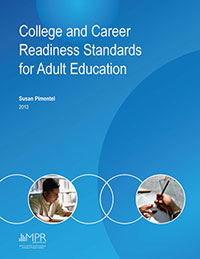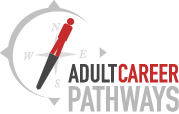This is an archived newsletter from ACP-SC and is available for archival purposes only. Hyperlinks on this page may be broken or may no longer link to the content specified from within the original posting date.
WorkReady U Moves Adult Career Pathways Forward in Louisiana
Some might say that Louisiana has experienced its fair share of challenges in recent years. The state's adult education system is no exception. More than 600,000 working age adults in Louisiana lack a secondary credential; ranking the state 47th in the nation for high school diploma attainment or the equivalent among adults ages 25-64. Yet national workforce projections indicate that in five years 64 percent of all jobs will require some form of postsecondary credential. Employers across the state are already experiencing difficulty filling skilled positions. This disconnect between what the Louisiana economy needs to thrive – a skilled workforce – and the available pipeline to support it, is one of the most pressing challenges facing the state.
In July 2010, Louisiana legislators approved a governance change for adult education. A move that state leaders hoped would better align adult education and workforce development. Previously the responsibility of the Board of Elementary and Secondary Education, the Adult Education Administration was transferred to the Board of Supervisors of the Louisiana Community & Technical College System (LCTCS). This placed adult education with an agency whose core mission is workforce education and training.
The move was designed to combine the strengths of existing adult education providers and LCTCS to deliver work-readiness and employment results to adults who want and need a better path to a sustainable livelihood. To accomplish these work-focused goals, and meet traditional adult education goals of literacy and high school equivalency diplomas, a new model for the delivery of adult education services was born, WorkReady U. This new model places the responsibility for adult education with the LCTCS, allowing WorkReady U to offer clear pathways into and through career and technical education programs that lead to family-sustaining jobs.
WorkReady U has embraced priorities that include performance benchmarks for:
- High school equivalency diplomas,
- Postsecondary program enrollments,
- Postsecondary program completers, and
- Sustainable employment placements.
To deliver its services, WorkReady U leverages the experience of a diverse network of local providers including Local Education Agencies (LEAs), community-based organizations, faith-based organizations, community colleges, and correctional facilities. The WorkReady U provider network consists of 34 programs that operate more than 200 adult education instructional sites throughout Louisiana which provide:

Angelicia Purvis, an Introduction to Automotive Pathways student, is pictured participating in the lab requirements of the program.
- Basic skills remediation,
- Secondary credential preparation,
- Wrap-around student services,
- Transitional services, and
- Postsecondary dual enrollment.
This comprehensive adult career pathways approach gives lower-skilled adults the opportunity to see beyond earning a high school equivalency credential and provides the support they need to make their career goals a reality. Sean Martin, WorkReady U Executive Director says, "While the high school equivalency diploma is important in this state, the game-changer in Louisiana is sustainable employment. WorkReady U provides important connections to higher education and technical training with an end goal of sustainable employment. We're changing the mindset about what adult education can offer."
These connections are seen as critically important to Louisiana's adult education students, most of whom, about 80 percent, enter the system at the Adult Basic Education (ABE) level, functioning below the ninth grade. Many adult students have not experienced success in previous education systems, making the intensive focus on wrap-around and transition services, in addition to postsecondary co-enrollment, all the more important. The addition of flexible class scheduling has also been key for working adults and those with families. Under adult education's previous structure, a more traditional daytime class schedule was offered. The move to LCTCS has encouraged new policies that support evening classes.
Just a few years since its inception, WorkReady U boasts nine colleges with at least two career pathway programs in place that are labor-market driven. Pathways include healthcare, construction, and biosciences, among others. The LCTCS is on track to scale programs at all thirteen of the state's two-year colleges by the end of this year. Martin attributes this progress to the tremendous commitment by local college chancellors and regional directors. WorkReady U has presented a learning curve for everyone, including the community and technical colleges. Each community has been asked to identify and engage local stakeholders, a critical step in building partnerships among adult education, workforce development, and local businesses where they didn't previously exist.
"It's been a challenge at times. We have to have a product (in the form of program graduates) before we can demonstrate the success of the initiative. This fall, we'll see the first cohorts complete their career pathways programs," says Martin. "We're continuously evaluating what's working, and what we need to streamline or modify." The recent implementation at LCTCS of a statewide student information system will provide a better mechanism for the colleges to work together. According to Martin, "We're building an information system for WorkReady U that will interface with the LCTCS system, providing everyone a clearer picture of how our students are doing."
"WorkReady U's comprehensive approach offers adult students the opportunity to see the big picture;" says Martin, "to see a clear path to the middle class by obtaining the skills necessary to secure family-sustaining employment." This approach helped Louisiana secure a three-year, $1.6 million grant through the Accelerating Opportunity initiative led by Jobs for the Future and funded by a strategic partnership of leading philanthropies, including the W.K. Kellogg Foundation. "This initiative could not have come at a more opportune time for Louisiana," said Dr. Joe May, president of the LCTCS. "The grant funds will help to ensure more adults benefit from the WorkReady U model while creating the workforce the state of Louisiana demands."
Martin reports that retention and performance is increasing within WorkReady U programs which will also help the state serve more students. Small cohorts, extra counseling and support services, flexible scheduling, and a laser-like focus on postsecondary credentials and sustainable employment should yield significant benefits for program graduates, their future employers, and Louisiana's economy.
Special thanks to contributors Sean Martin and Raye Nell Spillman of the Louisiana Community & Technical College System.
Research and Policy Corner
College and Career Readiness Standards for Adult Education
April 2013, U.S. Department of Education, Office of Vocational and Adult Education
The College and Career Readiness Standards (CCR) for Adult Education report was prepared by MPR Associates, Inc. as part of the Promoting CCR Standards in Adult Basic Education Project under contract to the U.S. Department of Education, Office of Vocational and Adult Education. The project's final report provides a set of college and career readiness standards that reflect content most relevant to preparing adult students for success in college, technical training programs, and employment in the 21st century. To arrive at the recommended benchmarks, two independent panels of subject-matter experts were convened to examine the Common Core State Standards (CCSS) from the perspective of adult education. The following questions guided the panelists' review:
- What content in the area of English language arts and literacy (ELA/literacy) is most relevant to preparing adult students for success in higher education and training programs?
- What content in the area of mathematics is most relevant to preparing adult students for success in higher education and training programs?
- Which standards in each content area are most important for adult students?
Download the report at: http://lincs.ed.gov/publications/pdf/CCRStandardsAdultEd.pdf![]()
A Skills beyond School Review of the United States
2013, Organisation for Economic Co-operation and Development (OECD)
In July, the OECD released a report on the state of postsecondary career and technical education in the United States as part of a review funded by OVAE and the National Center for Education Statistics. The review was conducted by the OECD's Skills beyond School project, examining the preparation of young people and adults for technical and professional jobs through postsecondary education and training in more than 20 countries. Research for the U.S. report was conducted from May 2012 through March 2013 and includes state case studies from Florida, Washington, and Maryland.
The report's five chapters explore:
- The global challenge of skills,
- Funding for quality,
- Anchoring credentials in the needs of industry,
- Building transitions that work, and
- Making it happen: Implementation
Download the report: http://www.oecd.org/edu/skills-beyond-school/ASkillsbeyondSchoolReviewoftheUnitedStates.pdf![]()
Featured ACP Resources
The Office of Vocational and Adult Education (OVAE) recently sponsored a webcast/webinar series featuring experts from the field in conversation on Adult Career Pathways issues.
ACP-SC Webcast Series
Applying Lessons Learned from Career Technical Education to Adult Career Pathways, June 2013
Watch Albert Palacios, Education Program Specialist College and Career Transitions, U.S. Department of Education, Office of Vocational and Adult Education; Blake Flanders, Vice President for Workforce Development, Kansas Board of Regents; and Brian Durham, Senior Director for Academic Affairs and Career and Technical Education, Illinois Community College Board, discuss perspectives and recommendations for Adult Career Pathways program design based on their experiences administering CTE and adult education collaborative efforts. [Filmed live at the National Career Clusters Institute.]
Adult Career Pathways in Correctional Education and Re-Entry Programs, July 2013
Hear John Linton, Director, Office of Correctional Education, U.S. Department of Education, Office of Vocational and Adult Education; Renee Collins, Program Administrator, Jail Program, Elk Grove Adult and Community Education; and Brian Walsh, Corrections Education Director, Peninsula College, share perspectives and recommendations on developing and implementing Adult Career Pathways programs in correctional education and reentry settings. [Filmed live at the Correctional Education Association Conference.]
Watch these and five additional webcasts on Adult Career Pathways topics at:
http://www.acp-sc.org/training/course-premieres
OVAE Community College Webinar Series
The following series of community college webinars highlight the important work of institutions across the country and the many contributions they make to the communities they serve. Each webinar brings together experts from the field and local practitioners to discuss key challenges institutions face and highlight promising institutional practices and policy changes that aim to increase postsecondary student success. Webinar broadcasts include:
- Community Colleges in Career Pathways Systems,
- Contributions of Community Colleges to Successful Reentry, and
- Transforming Adult Education to Ease Postsecondary Transitions.
The archived materials for each of these webinars—including audio/video, PowerPoint files, and transcripts—can be accessed at: http://www2.ed.gov/about/offices/list/ovae/pi/cclo/meetings.html
Email: info@acp-sc.org
Phone: 703-688-ACP7 (2277)
Kratos Learning, ACP-SC Project
2920 South Glebe Road
Arlington, VA 22206
Disclaimer: The Adult Career Pathways (ACP) News is a publication of the Designing Instruction for Career Pathways (DICP) initiative and was produced by Kratos Learning, in partnership with the Center for Occupational Research and Development, with funding from the U.S. Department of Education (ED), Office of Vocational and Adult Education (OVAE), under Contract No. ED-CFO-10-A-0072/0001. The opinions expressed herein do not necessarily represent the positions or policies of the U.S. Department of Education, and no official endorsement by the U.S. Department of Education should be inferred. This document is in the public domain and may be reproduced without permission.



